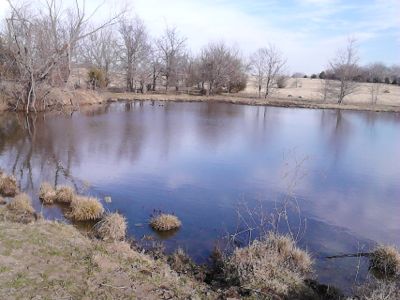
About 15 dwellings are planned for the Wildflower Ecovillage, formerly known as the DFW Ecovillage, on this 70-acre property in Greenville, northeast of Dallas. Photos courtesy of Wildflower Ecovillage.
July 2, 2014
By Penelope Taylor
Several years ago, Terry Jensen decided she wanted to live around like-minded folks who cared about the environment and other social issues. When she discovered the ecovillage concept, she said "That's the place for me."
Robert Gilman, an astrophysicist and sustainability proponent, is credited with defining ecovillage in 1991.
He described it as “a human-scale full-featured settlement in which human activities are harmlessly integrated into the natural world in a way that is supportive of healthy human development and can be successfully continued into the indefinite future."
Today, Jensen is bringing the movement to North Texas with the Wildflower Ecovillage in Greenville.
“This is for people who want to live off the grid and be as sustainable as humanly possible as they can be in today’s world,” said Jensen.
Wanting to stay in the Dallas area to be close to family, initially she looked in Euless. But concerns about the potential impact of natural gas drilling led her to consult with a geologist to find somewhere less attractive for natural gas extraction. The geologist steered her to Hunt County and Jensen ultimately selected Greenville, despite her lack of experience in country living.
"I'd never even seen a farm upclose," joked Jensen.
After living there a year as a trial run, in December 2013 she bought a 70-acre parcel of land.
About 15 dwellings are planned at the Wildflower Ecovillage, which will be built using permaculture practices.
 So far about a dozen people have shown interest in joining the co-op. The homes have not been constructed yet, but Jensen has purchased a compressor to create compressed earth bricks or CEBs as their building material.
So far about a dozen people have shown interest in joining the co-op. The homes have not been constructed yet, but Jensen has purchased a compressor to create compressed earth bricks or CEBs as their building material.
Right, compressed earth blocks are good insulators.
The process uses on-site materials, compressing the existing earth to reduce cost and increase efficiency and sustainability. The bricks can be shaped into arches or curves and they don’t need mortar for construction, which minimizes labor and materials cost. The blocks are strong, stable, water-resistant and long-lasting. They hold in heat, minimizing the amount of artificial heating and cooling needed to keep homes comfortable.
“Most people have plans to build a small house and add on if it’s not big enough,” said Jensen.
Although the Ecovillage is what's known as an intentional community, where people share goals and philosophies for living, each home will be independently owned and may be designed by its owner. Each resident will have their own income and pay their own bills, and then the community will coordinate on decisions that affect the group at large.
Jensen investigated intentional communities and determined that 30 is an optimal number for community interaction, and the 70 acres at the Ecovillage will more than sustain those numbers.
 To assist with the process of growing food and building their own homes, the Wildflower Ecovillage has several ponds on the property. These will help to provide irrigation water for crops, although they will not be used for drinking water.
To assist with the process of growing food and building their own homes, the Wildflower Ecovillage has several ponds on the property. These will help to provide irrigation water for crops, although they will not be used for drinking water.
Left, Ponds will provide irrigation water.
Solar panels will provide power and rainwater harvesting will serve as an additional water source.
"If you figure out how much water falls on 70 acres, you'd be amazed," said Jensen.
The community plans to raise chickens and other fowl, but the vegetarian said they will not have cows or goats as the animals require a great deal of pasture for grazing and are not efficient users of the land.
Jensen is quick to point out that she is not the leader of the Ecovillage. There are three other founders besides Terry Jensen – Lisa Jensen, Sam England and Will Redwine – who all share the commitment to permaculture and sustainable living.
“Living in cooperation with nature makes life more rewarding and more conscious,” said England. “Finding out how this actually works is a challenge and most people will give up and return to a way of living that is more predictable and safe.”
They have formed a non-profit corporation for education about permaculture, the Wildflower School and Research Center. The non-profit currently holds periodic lectures in Greenville and then offers hands-on experience at the Ecovillage land.
Wildflower Ecovillage is currently running an Indiegogo campaign to raise funds for a tractor to create swales for raised crop beds at the property. An important part of sustainable farming, raised beds create a microclimate and extend the planting season.
With the tractor campaign underway, the brick compressor on premises and interest in the community continuing to grow, Jensen is excited about the future of the Wildflower Ecovillage.
“If you don't live around people with the same values, especially when it comes to growing food,” said Jensen, “somebody will be out there pouring Round Up [on the land] and think that’s OK.”
For more information on the Wildflower Ecovillage, its farming opportunities, internships, classes and scholarships to young farmers, contact Jensen at village12345@outlook.com.
Sign up for the weekly Green Source DFW Newsletter to stay up to date on everything green in North Texas, the latest news and events. Follow us on Facebook, Twitter and Pinterest.









